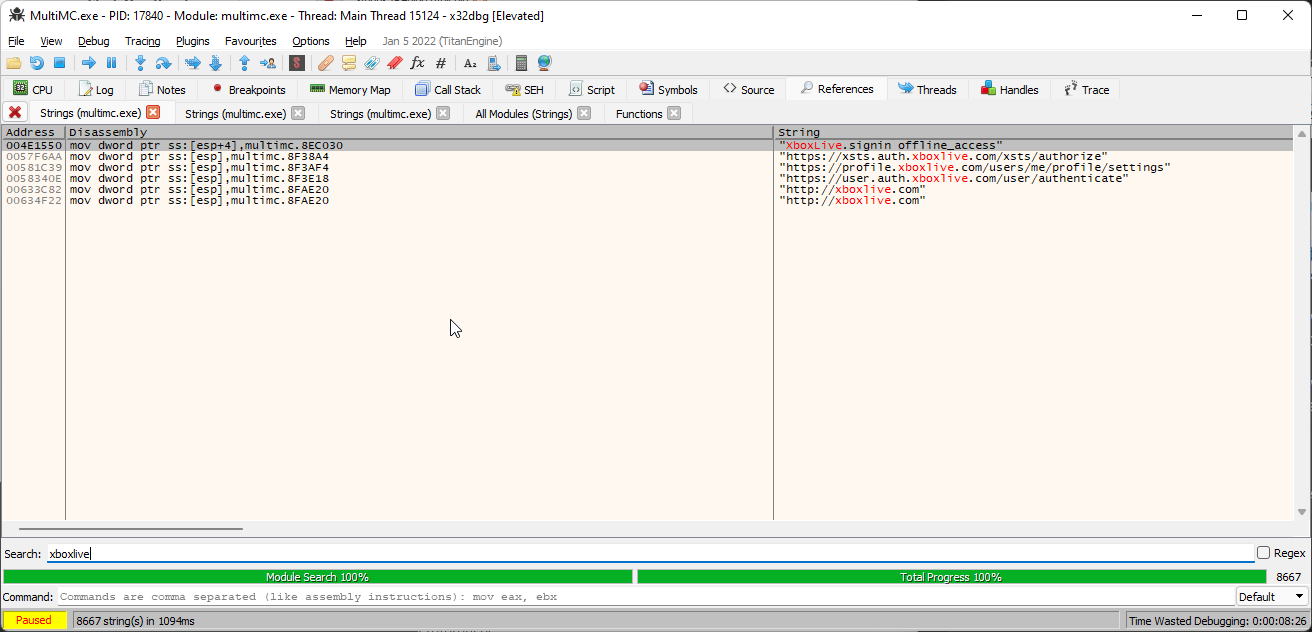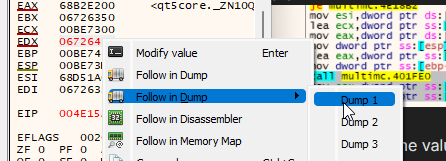"reverse engineering" MultiMC on windows to get its MSAClientID
it's more like reading a post-it note of a password kept inside of a glass box
The MultiMC maintainers are being kind of annoying to packagers right now. If you’d like to package your own build of MultiMC, you’d best be able to get an MSA Client ID, right? I’ve created this handy guide for you to get it yourself, in case it changes!
Please note, I am not affiliated in the slightest with PolyMC or MultiMC.
Setup
This guide is for Windows, since that’s the operating system I have reverse engineering tooling installed on.
All you need to do to follow along is:
- Download the MultiMC binaries
- Grab x64dbg (You want the contents of the
releasefolder)
Planning
This is a really trivial exercise: Since we have the source code of MultiMC, we can just… Look at it.
First, we find where the MSA client ID is used:

So we just need to set a breakpoint at this field assignment, and read the data from memory then :)
Dynamic Analysis
Since this is an open-source application without any anti-debugging techniques or anything, we can just use plain x64dbg without any trickery!
MultiMC is a 32-bit application, so we tell the ‘x96dbg’ launcher that we want to use the 32-bit version of the program, x32dbg:

Then, just head over to File -> Open and point it to your MultiMC5.exe:

This will start the process, but suspend it before it runs any code. Hit Debug -> Run to user code to skip all the win32 initialization stuff.
Now, we want to find where opts.clientIdentifier is set in MSAStep.cpp. We have a lot of strings to search for nearby, so let’s go for "XboxLive.signin offline_access".
Right click the disassembly and go for Search for -> Current module -> String references, and when it’s finished scanning type XboxLive. You should see the string we’re looking for:

Double-click it to jump to its reference. Now, we can examine the code around it. We know that the string will eventually be returned from APPLICATION->msaClientId(), and we see a reference to Application::self here, a little ways underneath the reference to the string literal we were looking for:

After the reference to self, there’s an internal call, and then some offloading of values on the stack to registers.

So we can set a breakpoint right afterwards. This will instruct x32dbg to pause the application once the CPU hits that instruction. You can then go to Debug -> Run to get a MultiMC5 window. to open up on your system. (If the debugger keeps pausing, you can hit Options -> Preferences -> Events and turn off auto-breaking on “System Breakpoints”.)
In MultiMC, you can then go to the account manager and hit ‘Add Microsoft’ to set up the MSAStep and grab the token. The application will freeze once it hits your software breakpoint.
Once it’s frozen, we can inspect the value of edx to find a pointer to a QString, which is a UTF-16 (LE) encoded string.
In the register view (in the top-right corner of the CPU pane), right click on the value of EDX and follow it in one of the dumps:

Conclusion
We are greeted with our prize, which is the UTF-16 encoded UUID:

As you can see, the value of the MSA Client ID in this release of MultiMC is 499546d9-bbfe-4b9b-a086-eb3d75afb78f :)
Obviously, the information is included in this post for educational purposes only. ;)